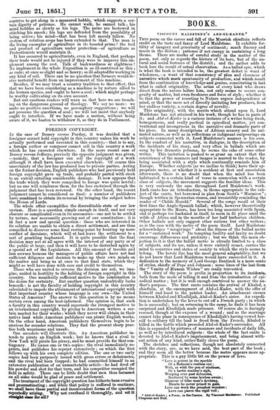FOREIGN COPYRIGHT.
Ii the case of Boosey versus Purday, it was decided that a foreigner cannot hold copyright in this country unless his work be actually performed and executed in this country,—that is to say, a foreign author or composer cannot sell in this country a work which he has executed elsewhere. In the more recent ease of Boosey versus Jefferys, precisely the opposite judgment was given, —namely, that a foreigner can sell the copyright of a work although it shall have been executed elsewhere. Of course this uncertainty of the law has produced loss to private parties. Acting on the former decision, English publishers who had previously held foreign copyright gave up -bade, and probably parted with stock to an extent entailing considerable damage. It now appears that the trade -which they were compelled to forego was quite lawful; but no one will reimburse them for the loss sustained through the judgment that has been reversed. On the other hand, the recent judgment cannot be considered as final: a number of publishers have combined to obtain its reversal by bringing the subject before the House of Lords.
The whole affair exemplifies the discreditable state of our law system. Here is a question simple enough in itself, and not very obscure or complicated even in its accessories—one not to be settled by nature, nor necessarily growing out of our constitution ; it is in fact a new and special question : those who are interested in its solution are unable to obtain a direct settlement, and are thus compelled to discover some final resting-point by hunting up more conflict of decisions, which will at last leave -the settlement to a sort of gambling haphazard. It is quite possible that the final decision may not at all agree with the interest of any party or of the public at large, and then it will have to be distil/shed again by a special act of the Legislature. All this amount of trouble and loss accrues because the managers of public affairs have not had sufficient diligence and decision to make up their own minds on the matter and bring us at once to that final state, which they might so well have done with ease and credit to themselves.
Those who are united to reverse the decision are not, we ima- gine, united in hostility to the holding of foreign copyright in this country. One manifestly sufficient motive to the combination is the desire for certainty. But another question undoubtedly lurks beneath : is not the faculty of holding copyright in this country calculated to impede the attainment of international copyright with that important country whose language is our own—the United States of America The answer to this question is by no means certain even among the best-informed. One opinion is, that such a faculty in this country would supersede the strongest motive to an international copyright, by giving to American writers a cer- tain market for their works ; which they never *ill obtain in their native land while American publishers can pirate English works. On the other hand, American publishers themselves begin to be anxious for sounder relations. They find the present sharp prac- tice both wearisome and unsafe.
One anecdote will illustrate this. An American publisher in- tends to pirate an English work ; but he knows that a rival in New York will pirate his piracy, and he must provide for that oon- tingency. He issues one or two copies : the rival immediately re- prints, and publishes his reprint extensively ; on which the first follows up with his own complete edition. The one or two early copies had been purposely issued with gross errors or deficiencies, and the rival had been trapped; he had committed himself to an extensive publication of an unmarketable article—he had fired off his powder and shot for that turn, and his competitor occupied the field in safety. There can be little doubt that men thus harassed on all sides would be glad of peace and settlement.
The treatment of the copyright question has hitherto beenevasive and procrastinating ; and while that policy is suffered to continue, we shall have these partial and inconvenient forms of the question repeatedly arising. Why not overhaul it Thoroughly, and set 71 straight epee for all?


























 Previous page
Previous page